
News • Cancer research
Origins of metastasis unraveled
For a long time, the origin of metastasis remained obscure. Now, scientists have discovered some of the mechanisms these cells arise.

For a long time, the origin of metastasis remained obscure. Now, scientists have discovered some of the mechanisms these cells arise.

Researchers outline a new minimally invasive and inexpensive blood test that can identify cancer in patients with non-specific symptoms and whether these cancers have metastasised in the body.

The risk of early breast cancer spreading to another part of the body ranges from 6% to 22%, according to the first results of a large and detailed global study of metastatic breast cancer presented at the Advanced Breast Cancer Sixth International Consensus Conference (ABC 6). The study also shows that certain women face a higher risk than others, including women diagnosed with breast cancer at…

Research led by the Queensland University of Technology (QUT) on the interaction between prostate cancer cells and the tumour microenvironment has shed more light on the propensity of some types of prostate cancer to metastasize to bone more readily than other types.

Scientists have identified two subtypes of metastatic prostate cancer that respond differently to treatment.

Hokkaido University scientists and colleagues in Japan have found a way that could help some patients overcome resistance to an immunotherapy treatment for cancer. The approach, proven in mice experiments, was reported in the Journal for Immunotherapy of Cancer.
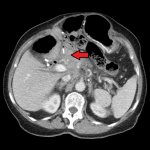
Pancreatic cancer is a disease of the elderly: the average age of patients is 72. In Austria, about 1,600 people are diagnosed each year. Since pancreatic cancer has no specific symptoms, it is not usually diagnosed until the tumor is locally advanced or has already metastasized. Once the tumor has metastasized, it is usually no longer treatable by surgery or radiotherapy. In addition, the drug…
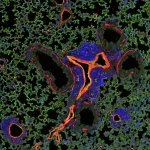
Scientists from the German Cancer Research Center (DKFZ) and the Medical Faculty Mannheim, Heidelberg University, have identified a new growth factor produced by blood vessels that enables tumor cells to metastatically colonize organs.

With an overall survival rate of 9% for those diagnosed, pancreatic cancer remains exceedingly difficult to treat. However, the patient's primary tumor typically isn't what leads to death - it is the cancer's ability to evade detection and metastasize to other organs. A team of researchers at the College of Medicine at the University of Oklahoma has published a new study in the journal…

According to the World Health Organization, one in six worldwide deaths have been attributed to cancer; however, these fatalities were not due to initial malignant tumors—the deaths were caused by the spread of cancer cells to surrounding tissues and subsequent tumor growth. These tissues, which consist largely of collagen, have been the focus of a recent collaborative study by a team from…

When cancer is confined to one spot in the body, doctors can often treat it with surgery or other therapies. Much of the mortality associated with cancer, however, is due to its tendency to metastasize, sending out seeds of itself that may take root throughout the body. The exact moment of metastasis is fleeting, lost in the millions of divisions that take place in a tumor. “These events are…

Hologic, Inc. has announced that it will acquire Biotheranostics, Inc., a privately held, commercial-stage company that provides molecular diagnostic tests for breast and metastatic cancers, for approximately $230 million, subject to working capital and other customary closing adjustments.
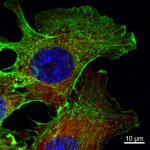
Cold Spring Harbor Laboratory (CSHL) scientists have discovered a gene-regulating snippet of RNA that may contribute to the spread of many breast cancers. In animal experiments, the researchers could reduce the growth of metastatic tumors with a molecule designed to target that RNA and trigger its destruction. The same strategy, they say, could be used to develop a new breast cancer treatment for…

A team at Purdue University has developed a novel testing platform to evaluate how breast cancer cells respond to the recurrent stretching that occurs in the lungs during breathing. The technology is designed to better understand the effects that the local tissue has on metastatic breast cancer to study how metastases grow in a new tissue.
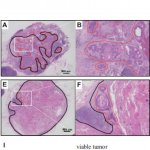
A group of researchers led by Osaka University established a new pathological grading system to evaluate the therapeutic effect of neoadjuvant chemotherapy (NAC) for metastatic lymph nodes (LNs) removed in esophageal cancer (EC) surgery, demonstrating that the system predicts recurrence and prognosis in EC patients better than conventional systems. Their research results were published in Annals…

Tiny finger-like projections called filopodia drive invasive behavior in a rare subset of lung cancer cells, researchers at Winship Cancer Institute of Emory University have found. Adam Marcus’ lab has developed innovative techniques for separating “leaders” and “followers,” subpopulations of tumor cells that cooperate during the process of metastasis. The lab’s new analysis of what…

What makes tumor cells turn murderous? The Fraunhofer Institute for Toxicology and Experimental Medicine ITEM is investigating the mechanisms of metastasis formation – and searching for approaches for new treatments in the fight against cancer. Among other things, the research team at Fraunhofer ITEM has developed a method that enables them to analyze entire lymph nodes.
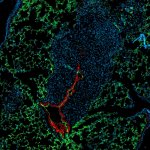
A receptor in the cell layer that lines the blood vessels from the inside stimulates both the formation of new blood vessels in tumors and metastasis.

A group of researchers led by Leif Schröder from the Leibniz-Forschungsinstitut für Molekulare Pharmakologie (FMP) have found a way to detect metastases in certain types of cancer in the brain at an early stage, using only minimal amounts of contrast agent. To this end, the team uses a synthetic molecule that helps to detect the formation of new blood vessels, producing much more sophisticated…
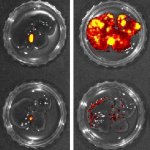
A protein that helps colorectal cancer cells spread to other parts of the body could be an effective treatment target, researchers from Hokkaido University discovered. Colorectal cancer patients with an immune system-regulating protein called interleukin 6 (IL-6) are more likely to have recurring tumors that can also spread to the liver, according to research published in the journal Cancer…

A new method to detect cancer in its early stages using a targeted MRI contrast agent that binds to proteins has been identified by a team of researchers led by Georgia State University Regents’ Professor Jenny Yang. In their study, published in the journal Science Advances, Yang and her colleagues at Georgia State and Emory University describe a newly identified biomarker for detection of…
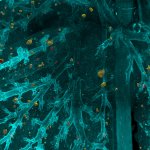
Teams at Helmholtz Zentrum München, LMU Munich and the Technical University of Munich (TUM) have developed a new algorithm that enables automated detection of metastases at the level of single disseminated cancer cells in whole mice. Cancer is one of the leading causes of death worldwide. More than 90% of cancer patients die of distal metastases rather than as a direct result of the primary…
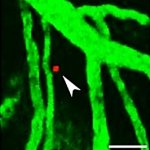
Lymphomas in the central nervous system are rare but dangerous. Scientists at the German Cancer Research Center (DKFZ) have now discovered which molecular mechanism leads to lymphomas forming metastases in the central nervous system.

Cancer of unknown primary (CUP) can send radiologists on a frustrating scavenger hunt: metastases were detected but the primary cancer is nowhere to be seen. Professor Alwin Krämer, Head of the Clinical Cooperation Unit Molecular Haematology/Oncology at University Hospital Heidelberg and the German Cancer Research Center, explains strategies for dealing with CUP.
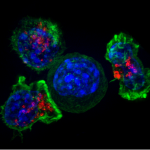
An anti-inflammatory drug called ketorolac, given before surgery, can promote long-term survival in animal models of cancer metastasis, a team of scientists has found. Furthermore, so-called "pro-resolution" therapies can also trigger the immune system to eliminate metastatic cells. The research also suggests that flanking chemotherapy with anti-inflammatory drugs can unleash anti-tumor…